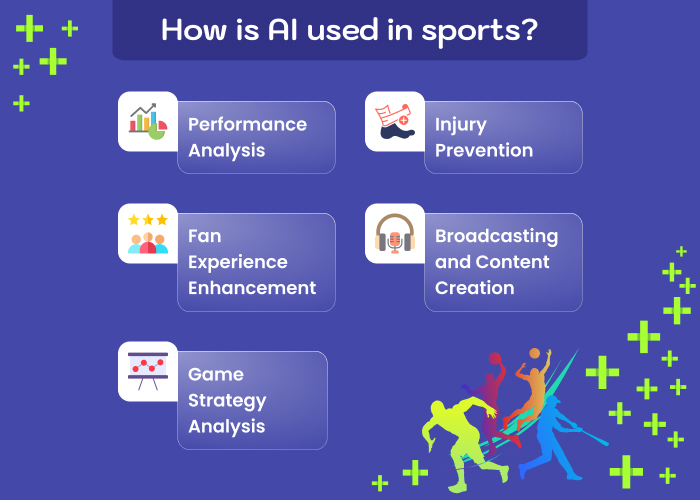How is AI used in sports?

- Performance Analysis: Large volumes of data gathered from sensors, cameras, and other sources may be analyzed by AI-powered systems to produce in-depth analyses of athlete performance. Thus, businesses or sports people may use this study to find strengths, flaws, trends, and opportunities for development.
- Injury Prevention: AI in sports can analyze biomechanical data to detect potential injury risks and suggest measures. Additionally, AI-driven rehabilitation programs can tailor treatment plans based on individual athlete characteristics, accelerating recovery and reducing the risk of re-injury.
- Game Strategy Analysis: AI-powered systems are able to evaluate opponent performance, past data, and game circumstances to provide coaches and players with real-time insights and suggestions. Thus, AI in sports aids teams in creating more successful game plans and enables them to make wise tactical choices throughout games.
- Fan Experience Enhancement: AI technologies like natural language processing and computer vision are being utilized to improve the fan experience. In order to engage fans before, during, and after games, AI-driven applications may offer tailored information, interactive experiences, and real-time analytics.
- Broadcasting and Content Creation: By automating processes like highlight reel production, video editing, and real-time commentary development, artificial intelligence (AI) algorithms allow broadcasters to provide more immersive and captivating sports coverage.
Ultimately, data-driven insights, performance optimization, increased fan interaction, and pushing the limits of athletic success are all ways that artificial intelligence is revolutionizing the sports sector. Artificial Intelligence is predicted to have a greater and more significant influence on sports as it develops, influencing training, competitiveness, and fandom.
What are the advantages of using AI in sports?
- Performance analysis can help coaches make more informed decisions about strategy, training, and game plans.
- Injury analysis helps coaches optimize training programs, monitor player workload, and suggest modifications to technique.
- Tactical information can help teams develop more effective game plans and adapt their tactics in real time during matches.
- Furthermore, it can deepen fan engagement and provide a more immersive experience.
- By evaluating player statistics, physical attributes, and playing styles, AI can assist coaches in identifying players who may be a good fit for their team.
- AI technologies such as video analysis and computer vision can assist referees in making more accurate decisions during matches. This can help reduce human error and ensure fairer outcomes.
What should you expect the usage of AI in sports in the future?
- AI-powered simulations of virtual and augmented reality will transform player training by generating realistic, immersive settings for tactical practice and skill improvement. Gamers will be able to improve their abilities in a safe and regulated environment by practicing against virtual opponents, going through various game scenarios, and getting real-time performance feedback.
- Advanced motion analysis techniques, coupled with wearable sensors and robotics, will enable coaches and sports scientists to fine-tune athletes’ movements.
- Cloud-based platforms, mobile applications, and low-cost wearable devices will make AI-driven tools more accessible to athletes and coaches worldwide, leveling the playing field and fostering greater inclusivity in sports.
Conclusion
As the sporting landscape continues to evolve, the integration of AI technologies is poised to revolutionize every aspect of the game. From performance analysis and injury prevention to fan engagement and broadcasting, AI in sports is reshaping the way we play, watch, and experience sports.
By leveraging cutting-edge algorithms and data-driven insights, athletes, coaches, teams, and fans are poised to unlock new frontiers of performance, innovation, and excitement in the world of sports. As AI continues to advance, its transformative impact on sports is only expected to grow, ushering in a new era of competitiveness, inclusivity, and technological prowess.
FAQs
How does AI in sports benefit player performance?
Can AI in sports help prevent injuries?
How does AI enhance the fan experience in sports?
What role does AI play in broadcasting sports events?
Will AI make sports more inclusive and accessible in the future?
Shivangi is a passionate Copywriter at Alian Software with expertise in technical copywriting. She shares information that is easy to understand regarding business, technology, and trends.